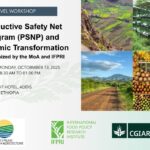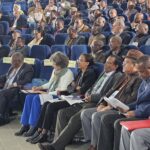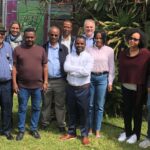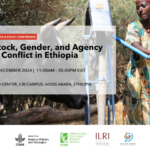A half-day high-level workshop on the Productive Safety Net Program (PSNP) and Economic Transformation was co-organized by the Ministry of Agriculture (MoA) and the International Food Policy Research Institute (IFPRI) on October 13, 2025, at Skylight Hotel, Addis Ababa. The event brought together representatives from government institutions and development partners for an insightful and engaging […]
IFPRI-ESSP and CGIAR Highlight: Key Research and Youth Dialogue at the 22nd International Conference on the Ethiopian Economy
On July 18–19, the 22nd International Conference on the Ethiopian Economy was held at the Ethiopian Economics Association (EEA) Conference Centre. As a co-organizer, the Ethiopia Strategy Support Program (ESSP) of IFPRI, together with the Policy Innovation Program of CGIAR, actively participated in the event. Presentation of Research Findings The IFPRI-ESSP team presented key research […]
PACT/GTM Impact Evaluation Partners Inception Meeting
On January 28, 2025, the Ministry of Agriculture (MoA) and the International Food Policy Research Institute (IFPRI) signed a Memorandum of Understanding to collaborate on the PAC/GTM Impact Evaluation Project. Concurrently, an inception meeting was held at the ILRI Campus in Addis Ababa, Ethiopia, attended by partners from MoA HQ, the Amhara and Oromia regions, […]
Livestock, Gender, and Agency Amid Conflict in Ethiopia
The Hybrid Research and Policy Conference on Livestock, Gender, and Agency Amid Conflict in Ethiopia, held on December 11, 2024, at the ILRI Campus in Addis Ababa and online, brought together a diverse group of policymakers, researchers, and development practitioners. The event was jointly organized by CGIAR Research Initiatives (NPS) and several key research institutes […]
Hybrid Research and Policy Conference on “Livestock, Gender, and Agency Amid Conflict in Ethiopia”
The CGIAR Initiative on National Policies and Strategies (NPS) presents: 'Livestock, Gender, and Agency Amid Conflict in Ethiopia' 📅 Dec 11, 2024, ILRI Info Center, Addis Ababa. Join us as we discuss CGIAR NPS’s latest findings to guide policies that strengthen Ethiopia’s livestock sector. CGIAR International Food Policy Research Institute (IFPRI) International Livestock Research Institute (ILRI) Policy Studies Institute […]
- 1
- 2
- 3
- …
- 19
- Next Page »




